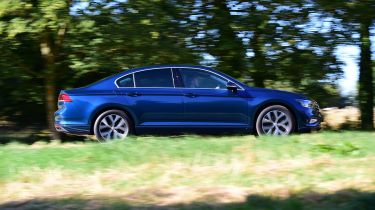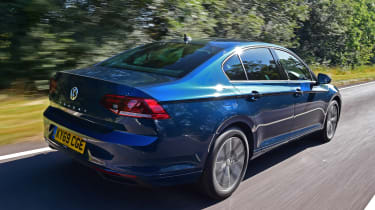Volkswagen Passat saloon - MPG, running costs & CO2 (2014-2021)
Fuel economy in the Volkswagen Passat is very competitive, but the warranty could be more generous
Volkswagen tells us that around 80% of Passats are sold to the fleet market, but low running costs are important whether you're a business user or private owner.
Volkswagen Passat MPG & CO2
On paper, the cheapest Passat to run is the plug-in hybrid GTE model, which is now even more economical than before, with an official figure of between 256.8mpg to 282.5mpg, CO2 emissions of just 24-27g/km and a pure-electric range of up to 40 miles. During a mix of motorway, country road and city driving, our average fuel economy according to the car’s computer was in the mid 50s – including two three-hour charges from a domestic electricity supply. While this is more than you’d achieve in a similarly powerful petrol car and compares well to the 197bhp 2.0-litre diesel, it’s a long way short of the claimed figures.
It’s also worth remembering that the GTE is a lot more expensive to buy than the diesel equivalent. However, the more you use the car in its pure electric mode, the better the fuel consumption will get. As well as saving you money on fuel, the GTE is also eligible for a £10 annual VED (tax) discount. Some versions of the GTE also attract an annual VED surcharge, payable in years two to six, as they can cost more than £40,000. This applies to all versions of the Passat where the list price (including options) exceeds this figure.
More reviews
Of the conventional diesel cars, the entry-level 1.6-litre Passat diesel has now been discontinued but managed around 51mpg. This engine felt underpowered when the car was fully loaded and often needed to be worked quite hard.
The 2.0-litre EVO diesel engine features cylinder deactivation technology, which shuts down two of the engine’s cylinders under light throttle. It’s available in 120bhp or 148bhp guises, managing between 54.3mpg-60.1mpg and CO2 emissions of 123-134g/km.
The flagship 197bhp 2.0-litre diesel engine is only available in R-Line spec cars, and comes fitted with the DSG gearbox. It's capable of between 51.4-54.3mpg and CO2 emissions of 137-142g/km. In late 2020, the four-wheel drive 4MOTION drivetrain was discontinued from the Passat lineup.
Fuel consumption across the Passat range is slightly affected by the size of the car's wheels – the smaller the wheels, the better the efficiency.
The petrol engines' economy is up to 46.3mpg if you pair a manual gearbox with the 148bhp 1.5-litre EVO engine; this also features cylinder deactivation. Fitting the DSG automatic in entry-level SE Nav trim sees this drop slightly to 45.6mpg. Emissions of 138 to 154g/km of CO2 place it in middling BiK bands for company-car drivers.
All petrol and diesel versions of the Passat cost the standard rate a year in VED (tax), £10 more than hybrid models.
Insurance group
Insurance groups for the Passat range from 12 to 28 – roughly the same as other saloon cars of a similar size. Unlike the previous entry-level S trim, which hasn’t been continued for the facelift model, all versions come with Volkswagen’s 'Pre-Crash' crash mitigation system that helps reduce your premiums.
Warranty
Like all Volkswagens, the Passat comes with a three-year/60,000-mile warranty that's eclipsed by models such as the Kia Optima, which offers a seven-year/100,000-mile guarantee. You can extend the Passat's warranty up to a maximum of five years or 90,000 miles at extra cost.
Servicing
Volkswagen offers a number of solutions that make it easier to pay for the maintenance of your car. Less than £20 a month covers servicing for two years/20,000 miles, three years/30,000 miles or four years/40,000 miles. If you’d prefer to pay for maintenance in one go, a minor service costs £150 and a major one £300.













